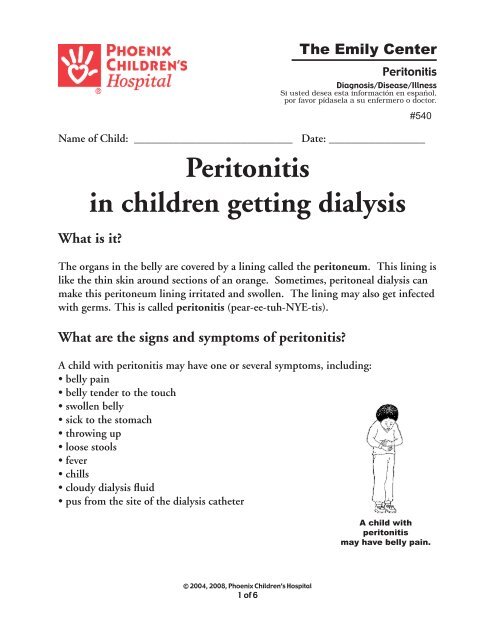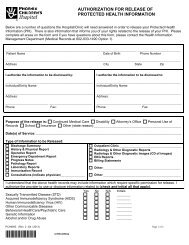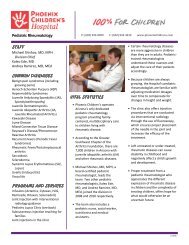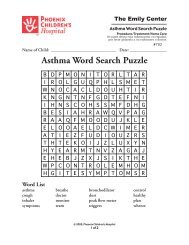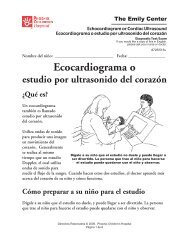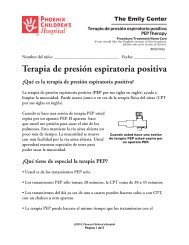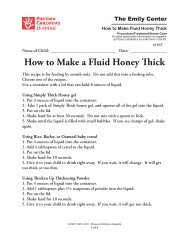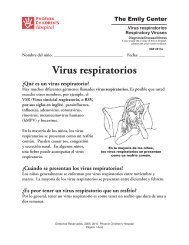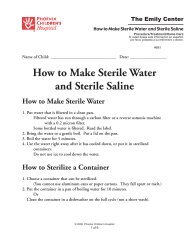Peritonitis - Phoenix Children's Hospital
Peritonitis - Phoenix Children's Hospital
Peritonitis - Phoenix Children's Hospital
Create successful ePaper yourself
Turn your PDF publications into a flip-book with our unique Google optimized e-Paper software.
The Emily Center<br />
<strong>Peritonitis</strong><br />
Diagnosis/Disease/Illness<br />
Si usted desea esta información en español,<br />
por favor pídasela a su enfermero o doctor.<br />
Name of Child: ____________________________ Date: _________________<br />
<strong>Peritonitis</strong><br />
in children getting dialysis<br />
What is it?<br />
The organs in the belly are covered by a lining called the peritoneum. This lining is<br />
like the thin skin around sections of an orange. Sometimes, peritoneal dialysis can<br />
make this peritoneum lining irritated and swollen. The lining may also get infected<br />
with germs. This is called peritonitis (pear-ee-tuh-NYE-tis).<br />
What are the signs and symptoms of peritonitis?<br />
A child with peritonitis may have one or several symptoms, including:<br />
• belly pain<br />
• belly tender to the touch<br />
• swollen belly<br />
• sick to the stomach<br />
• throwing up<br />
• loose stools<br />
• fever<br />
• chills<br />
• cloudy dialysis fluid<br />
• pus from the site of the dialysis catheter<br />
#540<br />
A child with<br />
peritonitis<br />
may have belly pain.<br />
© 2004, 2008, <strong>Phoenix</strong> Children’s <strong>Hospital</strong><br />
1 of 6
What do I do if I think my child has peritonitis?<br />
If your child has any symptom of peritonitis:<br />
Call the nurse or doctor right away.<br />
On weekdays from 8:30 am to 4:00 pm, call the nurse at the dialysis center<br />
at 602-546-4726 or 602-546-4719.<br />
When the dialysis center is closed, call 602-546-0965 and ask for the<br />
nephrologist on call.<br />
Do not give your child antibiotics until you<br />
— call the nurse or doctor, who will tell you what to do next.<br />
— get a sample bag to be tested.<br />
The doctor needs to know what kind of germ your child has,<br />
so your child can be given the right antibiotic.<br />
How is peritonitis treated?<br />
The goal of treatment is to get rid of the germs with an antibiotic.<br />
If your child has a lot of pain, the nurse or doctor may tell you to fill then drain<br />
right away, with manual bags of 1.5% solution, 2 or 3 times. This is called a flush.<br />
Your dialysis team will tell you how to treat your child’s peritonitis. They will<br />
decide if your child can be treated at home or needs to go to the hospital.<br />
What can I do to prevent peritonitis?<br />
Most infections are caused by germs normally found on the skin. You may prevent<br />
infection by keeping germs away from the catheter.<br />
1. Put on a mask.<br />
2. Wash your hands with soap and water for 3 minutes, rinse, and dry them.<br />
3. After you wash your hands, touch only the PD equipment or supplies. Don’t<br />
touch the sterile parts. If you touch something else, wash your hands again.<br />
Sometimes, you cannot prevent peritonitis.<br />
© 2004, 2008, <strong>Phoenix</strong> Children’s <strong>Hospital</strong><br />
2 of 6
Now that you’ve read this:<br />
p Tell your nurse or doctor the signs and symptoms of peritonitis. (Check when<br />
done.)<br />
p Tell your nurse or doctor what you would do if your child had any of the signs of<br />
peritonitis. (Check when done.)<br />
p Tell your nurse or doctor where you will keep your peritonitis kit so you could<br />
easily find it. (Check when done.)<br />
If you have any questions or concerns,<br />
p call your child’s doctor or p call ______________________<br />
If you want to know more about child health and illness,<br />
visit our library at The Emily Center at <strong>Phoenix</strong> Children’s <strong>Hospital</strong><br />
1919 East Thomas Road<br />
<strong>Phoenix</strong>, AZ 85016<br />
602-546-1400<br />
866-933-6459<br />
www.phoenixchildrens.com<br />
Disclaimer<br />
The information provided at this site is intended to be general information, and is provided for educational purposes only. It is not<br />
intended to take the place of examination, treatment, or consultation with a physician. <strong>Phoenix</strong> Children’s <strong>Hospital</strong> urges you to<br />
contact your physician with any questions you may have about a medical condition.<br />
Tuesday, November 25, 2008 • DRAFT to family review<br />
#540 • Written by Joanne Watson, BSN, RN and Nancy Grissom, RN<br />
• Illustrated by Dennis Swain<br />
© 2004, 2008, <strong>Phoenix</strong> Children’s <strong>Hospital</strong><br />
3 of 6
© 2004, 2008, <strong>Phoenix</strong> Children’s <strong>Hospital</strong><br />
4 of 6
The Emily Center<br />
Name of Health Care Provider: ________________________________ Number: 540<br />
For office use: Date returned: ____________ p db p nb<br />
Family Review of Handout<br />
Health care providers: Please teach families with this handout.<br />
Families: Please let us know what you think of this handout.<br />
<strong>Peritonitis</strong><br />
Diagnosis/Disease/Illness<br />
Si usted desea esta información en español,<br />
por favor pídasela a su enfermero o doctor.<br />
Would you say this handout is hard to read? p Yes p No<br />
easy to read? p Yes p No<br />
Please circle the parts of the handout that were hard to understand.<br />
Would you say this handout is interesting to read? p Yes p No<br />
Why or why not?<br />
Would you do anything differently after reading<br />
this handout? p Yes p No<br />
If yes, what?<br />
After reading this handout, do you have any<br />
questions about the subject? p Yes p No<br />
If yes, what?<br />
© 2004, 2008, <strong>Phoenix</strong> Children’s <strong>Hospital</strong><br />
5 of 6
Is there anything you don’t like about the drawings? p Yes p No<br />
If yes, what?<br />
What changes would you make in this handout to make it better or<br />
easier to understand?<br />
Please return your review of this handout to your nurse or doctor<br />
or send it to the address below.<br />
Fran London, MS, RN 602-546-1395<br />
Health Education Specialist<br />
The Emily Center<br />
flondon@phoenixchildrens.com<br />
<strong>Phoenix</strong> Children’s <strong>Hospital</strong><br />
1919 East Thomas Road<br />
<strong>Phoenix</strong>, AZ 85016-7710<br />
Thank you for helping us!<br />
© 2004, 2008, <strong>Phoenix</strong> Children’s <strong>Hospital</strong><br />
6 of 6


